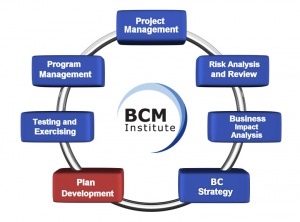Part 4: Incident Management Team v2: Difference between revisions
Jump to navigation
Jump to search
No edit summary |
(No difference)
|
Latest revision as of 14:45, 16 January 2020

Part 4: Incident Management Team

Sample Plan Content
The Incident Management Team will immediately come together and:
- Manage the incident locally
- Liaise with the emergency services
- Take action to protect staff and recover assets
- Ensure the continuity of business operations.
Core IMT Members
- Area or Local Manager
- Local Premises Manager and/or Head of Administration
- Manager IT
- Functional business managers
- A Coordinator or administrative assistant.
IMT Coordinators
The role of the coordinator is critical to the success of the emergency response. Unlike other members of the team, whose responsibilities remain broadly functionally based, coordinators will:
- Establish and secure Command Centres or if not available locations that can be suitably equipped and run.
- Convene meetings, prepare agendas and minutes.
- Report to senior management, as required.
- Maintain comprehensive records of the incident, in particular, all decisions and the reasons they were taken.
Activating the Plan
All incidents should be reported in the first instance to Manager Two or in his absence the Manager Three. Manager responsible for assessing the damage and confirm the seriousness of the incident and, if appropriate, notify the CMT Coordinator
CMT Coordinator will:

- Confirm the information and nature of the emergency
- Decide whether to activate the Crisis Management Plan if the local incident warrants such action.
In deciding whether to activate the CM plan managers should use the following guidelines as shown in Part 5: General Consideration